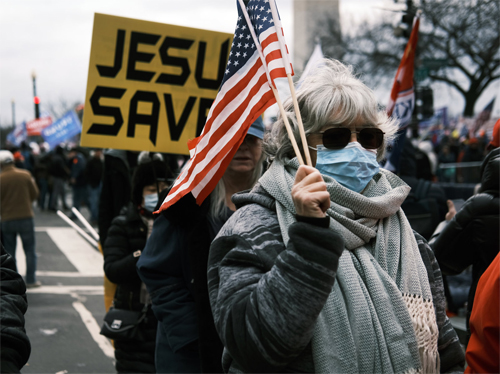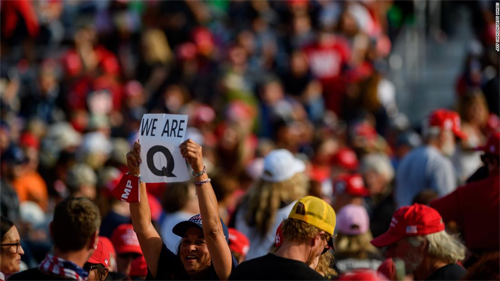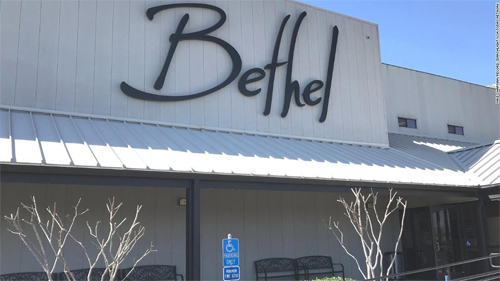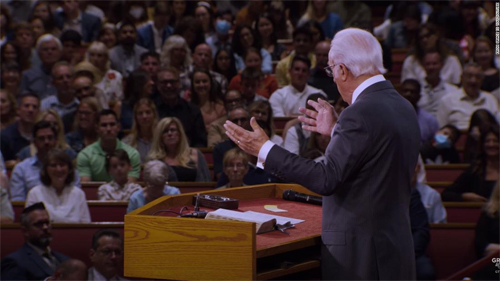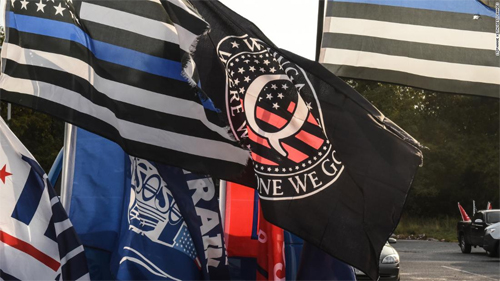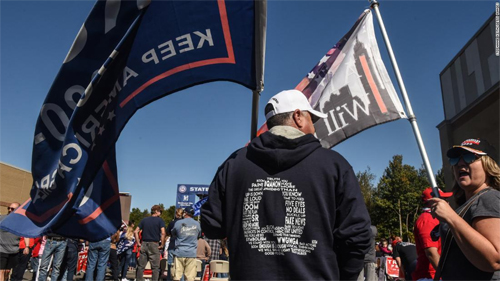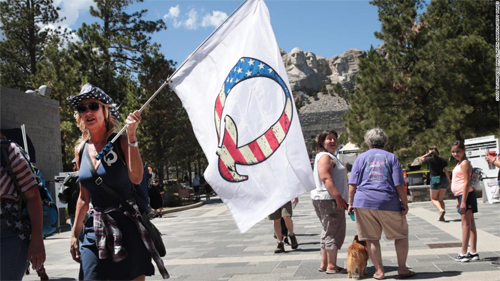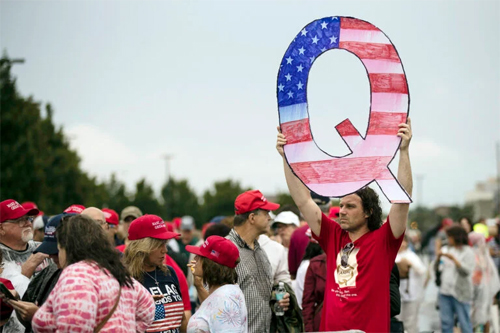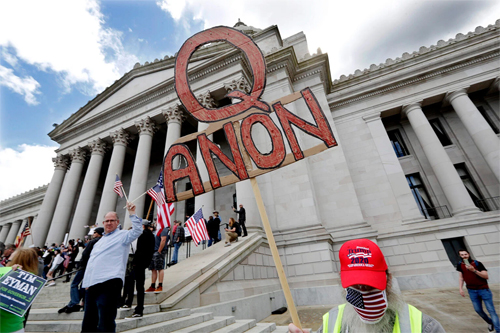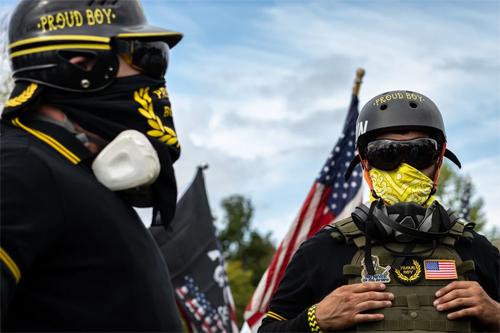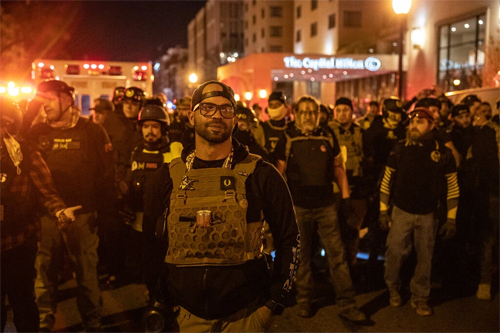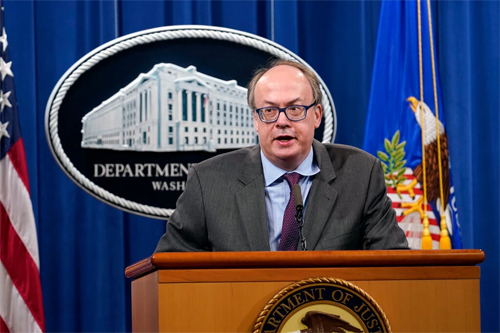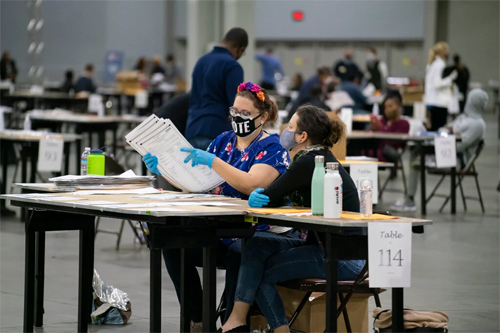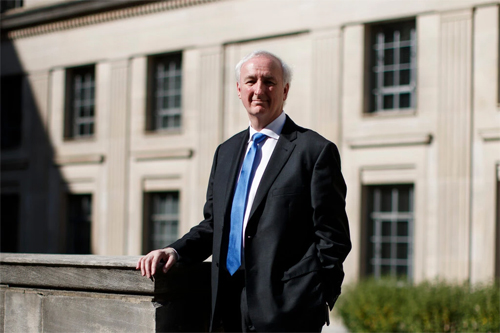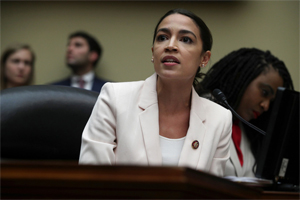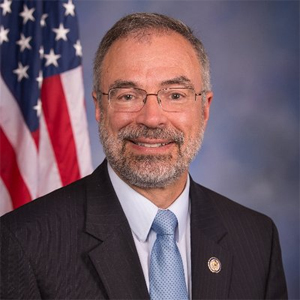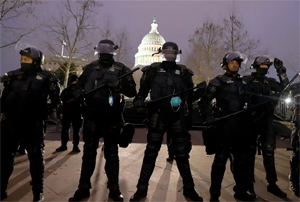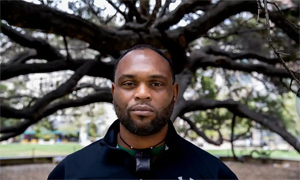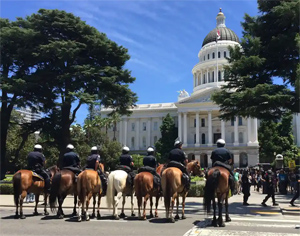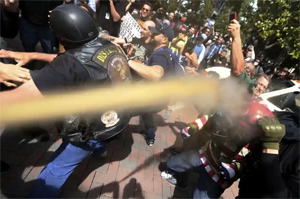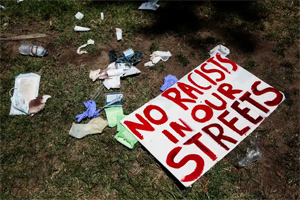by James Kitfield
Politico
October 16, 2016
NOTICE: THIS WORK MAY BE PROTECTED BY COPYRIGHT
YOU ARE REQUIRED TO READ THE COPYRIGHT NOTICE AT THIS LINK BEFORE YOU READ THE FOLLOWING WORK, THAT IS AVAILABLE SOLELY FOR PRIVATE STUDY, SCHOLARSHIP OR RESEARCH PURSUANT TO 17 U.S.C. SECTION 107 AND 108. IN THE EVENT THAT THE LIBRARY DETERMINES THAT UNLAWFUL COPYING OF THIS WORK HAS OCCURRED, THE LIBRARY HAS THE RIGHT TO BLOCK THE I.P. ADDRESS AT WHICH THE UNLAWFUL COPYING APPEARED TO HAVE OCCURRED. THANK YOU FOR RESPECTING THE RIGHTS OF COPYRIGHT OWNERS.
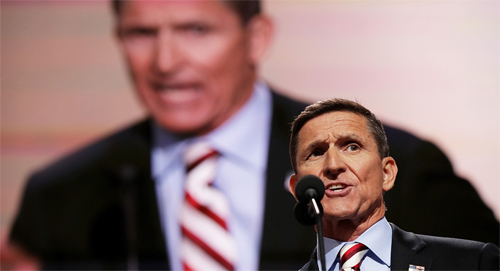
James Kitfield is senior fellow at the Center for the Study of the Presidency & Congress. He is a former senior correspondent for National Journal and has written about defense, national security and foreign policy issues from Washington, D.C., for more than two decades. He is the author of the forthcoming book “Twilight Warriors: The Soldiers, Spies and Special Agents Who Are Revolutionizing the American Way of War” (Basic Books).
On August 7, 2014, clusters of well-dressed men and women filed into the gleaming metal and glass superstructure of the Defense Intelligence Agency at Joint Base Anacostia-Bolling, just across the river from Reagan National Airport, for the retirement ceremony of Lieutenant General Michael T. Flynn, the agency's director. Among those present to honor Flynn were James Clapper, the nation’s top intelligence officer—who was a master of ceremonies for the event—and Michael Vickers, the undersecretary of defense for intelligence.
It wasn’t an easy moment. Together, Clapper and Vickers had forced Flynn out as the head of DIA.
The Defense Intelligence Agency is the Pentagon’s version of the CIA, a vast intelligence organization focused on providing senior officials in the Office of the Secretary of Defense, and senior uniformed leaders, with the intelligence necessary to develop strategy and make scores of difficult decisions each day. During the ceremony, Flynn would be extolled by Admiral Mike Rogers, the director of the National Security Agency, as “the best intelligence officer of the past 20 years.” But given the nature of the intelligence business that united them, many of the attendees also knew that Flynn’s retirement at age 56 was premature. A well-known maverick, Flynn had been asked to “shake things up” at the 17,000-person agency. He brought a more wartime mind-set and ethos to a sleepy Washington bureaucracy, until the bureaucracy pushed back and Flynn’s gung-ho style was deemed too “disruptive” for an administration determined to put the unpleasant memories of Iraq and Afghanistan in the rearview mirror.
Taking the podium, Flynn, dark-haired with an aquiline face and a surfer’s wiry build, waved to his many family members in the crowd. He acknowledged the many senior officials in attendance, including his nemeses, Clapper and Vickers. He also made special note of retired General Stanley McChrystal, with whom Flynn had transformed the U.S. Joint Special Operations Command (JSOC) into history’s most lethal terrorist hunting network. “If there is any one individual in this country who changed the way America fights its wars, it was Stan,” Flynn told the capacity crowd. Of course, everyone there knew that McChrystal, too, had been ousted from his job, after an article in Rolling Stone titled “Runaway General” quoted unnamed members of his staff making disrespectful comments about the White House. Inside military and intelligence circles it was understood that McChrystal, along with another ousted former general, David Petraeus, were the preeminent generals and wartime field commanders of their generation of officers, and the manner of their dismissal struck many as insulting. As did the treatment of Lt. Gen. Mike Flynn.
As a longtime national security correspondent, I had wrangled an invitation to the retirement ceremony after Flynn granted me his final on-the-record interview as DIA director. In it, Flynn warned that the United States was actually less safe from the threat of terrorism in 2014 than it was prior to the 9/11 attacks. In remarkably blunt comments for a general still in uniform, Flynn admitted to feeling like a lone voice inside an Obama administration that seemed to believe that the 2011 death of Osama bin Laden had signaled the end of radical Islamist terrorism as a seminal threat. Just months earlier, President Barack Obama had referred to the ascendant Islamic State group, also known as ISIS or ISIL, as a “JV,” or junior varsity, team of terror.
One other senior commander had been scheduled to speak at Flynn’s retirement ceremony but canceled at the last minute: General Martin Dempsey, chairman of the Joint Chiefs of Staff. Later that same day, August 7, 2014, the reason for Dempsey’s absence became clear. Obama announced that U.S. warplanes had begun bombing ISIS targets, and U.S. troops would soon be dispatched back to Iraq. So Flynn had been right all along: The global war against radical Islamist terrorists was far from over.
I wondered at the time whether confirmation of the fact on the day of his forced retirement might make Flynn bitter.
***
“Lock her up! Yes, that’s right, lock her up!” Flynn shouted, his visage amplified to colossus dimensions by the huge video screen behind the podium at the Republican National Convention, where he was calling for the imprisonment of his former colleague, ex-Secretary of State Hillary Clinton. Before millions of television viewers, Flynn led the chants of a raucous crowd during his speech endorsing Donald Trump. “Lock her up! Lock her up! Damn right! Exactly right!” Flynn encouraged the chanting crowd. “There is nothing wrong with that!”
In many respects, his July 18 speech at the Republican Convention was quintessential Flynn, a full-throated defense of “American exceptionalism” and strong and unapologetic U.S. leadership; a warning that the threat from radical Islamists is growing and a rejection of “political correctness” that keeps officials from accurately identifying the enemy; and an insistence that winning wars is about never “drawing red lines and then retreating." In each case, Flynn has significant evidence backing his argument. Yet some of the people close to Flynn have been alarmed both by the candidate he has chosen to embrace, and by the uncharacteristic vitriol in the way Flynn has been talking, both in that speech and subsequent comments. Flynn has emerged as Trump’s national security alter ego, accompanying him on intelligence briefings and serving as his chief adviser on military issues.
Those who've known Flynn for years wonder how a kid from an Irish Catholic family of blue-collar Democrats who went on to be a dedicated, much-admired soldier ended up being a top national-security adviser to a man widely viewed as a demagogue, friendly to Russia and widely seen as ignorant of foreign policy. They worry that in his political naivete and innate loyalty Flynn is being used—and will be branded as a radical himself. And some of them are concerned that Flynn, who believes he was pressed into early retirement for appearing to question the Obama administration’s public narrative that Al Qaeda was close to defeat, is being handed a national stage to play out his personal frustrations.
In Flynn’s speech, Obama has been a “weak and spineless” leader who “coddles” terrorists and has brought mayhem to our streets with his “fumbling indecisiveness,” “willful ignorance” and “total incompetence.” Clinton should not only be locked up for her careless handling of classified emails, he has repeatedly said, but she is also “somebody who will leave Americans behind on the battlefield.”
In a recent exclusive interview, Flynn was unapologetic about his harsh rhetoric. In his mind, Clinton “did real damage to the country” and has dodged all accountability with her use of an unclassified email server to conduct government business, and the Obama administration perpetrated a “big lie” in insisting that the enemy, Islamist terrorists, is on the run. “So when Republican presidential candidates reached out and asked for my advice and help, I thought I had something to offer because of my strong belief that the country is going in the wrong direction.”
Yet a number of Flynn’s old bosses and some of the most respected leaders among the generally collegial fraternity of retired general and flag officers have been unsparing in their criticism. For months, retired Admiral Mike Mullen, former chairman of the Joint Chiefs of Staff, had reached out privately to Flynn trying to get him to tone down his rhetoric on the public airwaves. For Mullen, the Republican Convention speech was a final straw. “For retired senior officers to take leading and vocal roles as clearly partisan figures is a violation of the ethos and professionalism of apolitical military service,” Mullen wrote recently to the Washington Post. “This is not about the right to speak out, it is about the disappointing lack of judgment in doing so for crass partisan purposes. This is made worse by using hyperbolic language all the while leveraging the respected title of ‘general.’”
There is precedent for retired generals endorsing candidates in presidential elections, but it is discouraged in a military culture that demands strict nonpartisanship from those in uniform, and encourages even retired general officers to stay above the political fray. To have a respected and fairly recently retired general excoriate his former wartime commander in chief before millions of Americans on television was jarring in the extreme. Some of Flynn’s former bosses worried that it would drag the military into the kind of hyperpartisan mudslinging contest from which the uniform rarely emerges unsullied. When retired four-star Marine Corps General John Allen spoke in support of Clinton at the Democratic National Convention, the previous chairman of the Joint Chiefs cried foul on him as well.
In a letter to the Washington Post, former chairman Martin Dempsey also noted that Flynn and Allen "weren't introduced at the Democratic and Republican conventions, respectively, as 'John' and 'Mike.' They were introduced as generals. As generals, they have an obligation to uphold our apolitical traditions … they have just made the task of their successors—who continue to serve in uniform and are accountable for our security—more complicated."
Even more egregious in the eyes of many national security experts and former colleagues is Flynn’s bestowing legitimacy on the particular Republican presidential nominee this year. Trump has trampled on, or simply ignored, many of the fundamental tenets and doctrines that have defined U.S. national security and foreign policy for decades. In Trump’s America, terrorism suspects would be tortured and their families killed in clear war crimes, even as the country instituted a ban on Muslim immigrants. The U.S. nuclear umbrella would fold over South Korea and Japan, possibly provoking them to develop their own nuclear weapons arsenals and risking a long-feared breakout in nuclear proliferation. NATO allies could no longer assume American support if attacked by Russia.
In Trump’s worldview, Vladimir Putin is praise-worthy as a strong leader despite his penchant for dismembering neighboring states and brutally silencing critics and journalists. Trump even invited the Russian strongman to hack into Clinton’s email (he later claimed it was a joke) after U.S. intelligence officials said Russia was behind a recent hack of the Democratic National Committee. He has claimed that Obama created ISIS, and darkly insinuated that he may be sympathetic to its murderous attacks. Trump has also denigrated U.S. prisoners of war, engaged in a public spat with a Gold Star family who lost their son in Iraq; and claimed that current U.S. military leaders have been “reduced to rubble” and are “embarrassing for our country.”
Such demagoguery helps explain why more than 100 Republican national security experts signed a letter denouncing Trump last spring, citing a vision of American power that is “wildly inconsistent and unmoored in principle”; and why last month 50 Republicans, including former Cabinet officials and two former heads of the Department of Homeland Security, signed a letter predicting that Trump would be “the most reckless president in American history.” Those sentiments were recently seconded by lifelong Republican Robert Gates, the former secretary of defense and director of the CIA, who in a scathing Wall Street Journal op-ed called Trump “beyond repair” and someone who would be a “thin-skinned, temperamental, shoot-from-the-hip and lip, uninformed commander-in-chief” and “too great a risk for America.”
In private emails hacked and leaked to the press, Colin Powell, former secretary of state and chairman of the Joint Chiefs, called Trump a "national disgrace and an international pariah" and Flynn “right-wing nutty” for empowering him. "Flynn got fired as head of DIA. … I asked why Flynn got fired. Abusive with staff, didn't listen, worked against policy, bad management, etc. He has been and was right-wing nutty every [sic] since,” Powell wrote, later wondering "how [Flynn] got that far in the Army?"
To counter that withering criticism from Republican ranks, the Trump campaign released a letter signed by 88 former generals and admirals supporting his candidacy and arguing that it represents a “long-overdue course correction in our national security posture and policy.” Many see the hand of Flynn, who was earlier vetted as a possible vice president on the Trump ticket.
In interviews, Flynn admits he and Trump don't agree on everything, but he remains unapologetic in his service to the candidate. “To my old colleagues who disagree with my speaking out, my question to them is: ‘When did we stop being American citizens?’” Flynn said. Former colleagues may criticize him for using the title of ‘general’ before his name in speaking on behalf of the Trump campaign, “but I earned that title. I worked my ass off for it. I guarantee that many of my critics used that title of ‘general’ or ‘admiral’ to get lucrative positions on corporate boards.”
After spending years in Iraq and Afghanistan witnessing the expenditure of vast national resources, including the loss of many American lives, Flynn said he began to “wonder why we weren’t fixing how we fight these wars? So I’m very passionate about this country that I just finished spending my entire adult life trying to defend. And if I have to pay a personal price for my views, and Colin Powell wants to call me a jerk, I don’t have any problem with that. I know the truth and what I believe in.”
At his retirement ceremony, it had occurred to me that Flynn’s story was part of a larger narrative that stretched beyond his own career. He talked movingly about his late father, Francis Flynn, a career Army sergeant who fought in World War II and later Korea. He described how Francis taught his sons how to be a good leader, and what it meant to win a war that defeated tyranny and liberated the world. When Mike and later his brother Charlie told their father that they, too, were joining the Army, he didn’t hide his pleasure at the news. Francis Flynn told his sons, both of whom would improbably rise to the rank of general, “the name of ‘soldier’ is the proudest name anyone can bear.”
When the time came, Mike and Charlie Flynn went off to fight their wars. Only Afghanistan and Iraq would join Vietnam in the pantheon of the longest, most unpopular and unsatisfactory wars in American history. Their generation of officers received no parades or homecoming in victory, without which any soldier is adrift. In the long education of Lt. Gen. Michael Flynn, it’s possible to detect a silent but continuing conversation between a cherished father and a prodigal soldier and son, still searching for an elusive victory in a life-defining conflict.
***
To Flynn, it didn’t always seem elusive. It was in Iraq that he experienced his first epiphany about the nature of the enemy. In 2006, Mike Flynn was the chief intelligence officer for Joint Special Operations Command, and he often spent his evenings sitting at an interrogation table, speaking to Iraqi men of roughly comparable age and education, trying to grasp their seemingly unfathomable worldview. At the time, JSOC’s Task Force in Iraq was in a race against time with Al Qaeda in Iraq, and its bloodthirsty leader, Abu Musab Zarqawi. Zarqawi’s strategy of slaughtering Shiite Muslims as a way to ignite a sectarian civil war that would drive U.S. forces out of the country was working. Sunni AQI’s attacks and reprisals by Shiite death squads routinely claimed the lives of more than 3,000 Iraqis each month, many of them civilians.
Then one of JSOC’s Special Forces strike teams raided an AQI safe house and captured 12 men who were unlike the typical brutish Al Qaeda thugs. These older men were the senior managers and vice presidents of Al Qaeda in Iraq. The network they had established was sophisticated far beyond the early reckoning of U.S. commanders, with interlinked logistics, transportation, information, money management and strike operations, all of it worthy of a multinational conglomerate.
As JSOC’s director of intelligence, Flynn interrogated the senior Al Qaeda commanders at length. Sitting across from them at the detainee screening facility at Balad Air Base, Iraq, Flynn wondered why such obviously educated and intelligent people were devoting themselves to tearing their country apart, regardless of the horrendous toll in innocent lives. Some of the men had electrical engineering and other advanced degrees, but instead of building a bridge or helping establish a functioning government, they applied their talents to attacking vulnerable governing institutions in order to terrorize and intimidate civilians. He could understand their hatred of American interlopers, but the vast majority of their tens of thousands of victims were fellow Iraqis.
During the course of those interrogations and hundreds of others in both Iraq and Afghanistan, Flynn concluded that what united the terrorist warlords was a common ideology, specifically the extremely conservative and fundamentalist Salafi strain of Islam. Salafis believe the only true Islam is that version practiced by the Prophet Muhammad and his followers in the seventh and eighth centuries. They reject any separation of church and state in favor of puritanical interpretation of Islamic Sharia law. They are intolerant of other religions or sects, and at least in terms of Salafi Jihadists, their ideology is violent and expansionist by its very nature. The terrorist leaders he interrogated on a regular basis—whether they marched under the banner of Al Qaeda, the Taliban or ISIS—were true believers, every bit as committed to their ideology and skewed moral universe as Flynn was to his own.
“Over the course of all those interrogations, I concluded that ‘core Al Qaeda’ wasn’t actually comprised of human beings, but rather it was an ideology with a particular version of Islam at its center,” Flynn said in the recent interview. “More than a religion, this ideology encompasses a political belief system, because its adherents want to rule things—whether it’s a village, a city, a region or an entire ‘caliphate.’ And to achieve that goal, they are willing to use extreme violence. The religious nature of that threat makes it very hard for Americans to come to grips with.”
With Joe Biden just days away from his inauguration as the nation's president, Pastor Darryl Knappen was still denying reality and even declaring himself willing to take up arms to keep Donald Trump in office.
"It was pastors who led the way in colonial times to encourage our country to shake off the totalitarian regime of the king of England," Knappen said in a Jan. 9 Facebook message to his Minnesota congregation. He was referring to the "Black Robed Regiment," a name given to those ministers who supported the Revolutionary War effort.
"I was tempted to wear my black robe today and cover up my AR-15 beneath it," Knappen said from his Cornerstone Church sanctuary in Alexandria, Minn., "but I thought that would be way too graphic for all of you and for Facebook to allow. But I would be part of that movement back then, and I may be part of that movement today."
Conservative evangelical Christians have been among Donald Trump's most fervent and loyal supporters. While few have gone as far as Knappen and endorsed armed struggle on his behalf, the rhetoric of some evangelical leaders has been notably militant.
In a conversation with conservative activist Charlie Kirk on Dec. 9, the right-wing Christian author and radio host Eric Metaxas said he did not care about the overwhelming odds against any effort to overturn the election of Joe Biden.
"What's right is right," Metaxas said. "That is so wrong. We need to do absolutely everything we can. What's going to happen is going to happen. But we need to fight to the death, to the last drop of blood, because it's worth it."
Three days later, Metaxas was the emcee at the Jericho March in Washington, where he and others implored God to keep Trump in office.
"We are here because we know he is the God who does real miracles when his remnant cries out to him in humility and love," Metaxas said. "We are here to cry out to the God of heaven to ask him to have mercy on the greatest nation in the history of the world."
A rally organizer, Robert Weaver, told the assembled crowd that God had appeared to him in a vision after Biden's election victory and told him, "It's not over."
-- Militant Christian Nationalists Remain A Potent Force, Even After The Capitol Riot, by Tom Gjelten, NPR
***
Another milestone in the education of Mike Flynn occurred in 2009, when General Stanley McChrystal was named the top U.S. commander in Afghanistan. Newly elected President Barack Obama had run for president calling Afghanistan the “right battlefield” and promising to “finish the job” there.
By then, McChrystal was one of the U.S. military’s most celebrated unconventional warriors, known for JSOC’s largely successful campaign against Al Qaeda in Iraq and the 2006 killing of its leader, Zarqawi. There were those in the White House, reportedly including Vice President Joe Biden, who hoped that McChrystal would embrace a similar, limited counterterrorism strategy of pinpoint strikes and night raids in Afghanistan. Such an approach would require far fewer U.S. ground forces.
In reassembling his JSOC brain trust, McChrystal chose Flynn as his chief intelligence officer and asked for an assessment of the situation in Afghanistan. Somewhat unexpectedly to many of his cohorts in the intelligence community, Flynn concluded that U.S. and allied forces were overly focused on killing terrorists and insurgents. He published his findings publicly in a think tank report without clearing it with his superiors, revealing a deep maverick streak. In that report, Flynn and his co-author concluded that “eight years into the war in Afghanistan, the U.S. intelligence community is only marginally relevant to the overall strategy. Having focused the overwhelming majority of its collection efforts and analytical brain-power on insurgent groups, the vast intelligence apparatus is unable to answer fundamental questions about the environment in which U.S. and allied forces operate.”
Meanwhile, McChrystal’s months-long review of U.S. strategy in Afghanistan was badly straining the relationship between his team and the White House. Obama’s inner circle worried that the U.S. military was trying to maneuver a new president into a Vietnam-like quagmire. McChrystal’s strategic assessment laying out potential options and troop numbers was leaked to the press by someone, convincing the White House team that the military was trying to pressure the president and limit his options.
Obama ultimately approved McChrystal’s more manpower-intensive counterinsurgency strategy and gave him 30,000 extra U.S. troops to implement it, while also setting a deadline for withdrawing the extra troops in 18 months. McChrystal was gratified that his campaign plan won the day, but he worried that the process leading up to that decision had left a lot of bruised feelings and distrust between his team and the White House. When Rolling Stone published its article “Runaway General” months later, quoting unnamed members of his staff criticizing Obama and Biden, those concerns were borne out. McChrystal was called back to Washington and relieved of command.
“It’s fair to say that McChrystal’s firing did leave a bad taste in my mouth,” Flynn said in our recent conversation. “Of course I felt bad for Stan, who had more combat experience than anyone else in the U.S. military at that time. But I also felt a lot of good work on the war effort and strong relationships with the Afghans that we had built were suddenly put in jeopardy. That’s also when I first began to think that the White House actually looks down on the military. I believe that to this day.”
***
In May 2013, President Obama delivered a seminal counterterrorism speech designed to break decisively with the post-9/11 past. The White House clearly wanted to capitalize on the killing of bin Laden, the pullout of U.S. troops from Iraq, and the approaching end to the war in Afghanistan to focus on his oft-stated priority of “nation-building here at home.” The president was also determined to close the detention center at Guantánamo Bay as a stain on America’s international reputation, and he was understandably concerned about the impact of the nation’s longest wars on civil liberties.
“Today, Osama bin Laden is dead, and so are most of his top lieutenants. There have been no large-scale attacks on the United States, and our homeland is more secure. Fewer of our troops are in harm’s way, and over the next 19 months they will continue to come home,” Obama said. “So, America is at a crossroads. We must define this struggle, or else it will define us. We have to be mindful of James Madison’s warning that ‘No nation could preserve its freedoms in the midst of continual warfare.”
For Mike Flynn, by then the director of the Defense Intelligence Agency, that narrative of a rapidly declining terrorism threat did not comport with the intelligence that routinely crossed his desk. In 2012, the National Intelligence Council had even crafted a draft National Intelligence Estimate that was supposed to represent the consensus view of the U.S. intelligence community, which reportedly concluded that Al Qaeda was no longer a threat to the United States. Flynn and a number of other senior intelligence officials had successfully pushed back hard against that conclusion as grossly premature.
Al Qaeda’s core leadership might have been decimated in Pakistan, but its close affiliates were drawing strength from instability spreading across the Middle East and Africa in the wake of the Arab Spring upheavals that began in 2011. That dynamic had worrisome parallels to the conditions in Afghanistan in the 1990s that originally spawned Al Qaeda. Flynn had DIA analysts distill that intelligence into a PowerPoint slide that showed that the number of radical Islamist terrorist groups had nearly doubled between 2004 and 2013, and occupied a far larger global footprint.
In the White House’s argument that the killing of bin Laden and many of his lieutenants had sounded the death knell for Al Qaeda, Flynn also once again sensed a misplaced belief that a tactic of “decapitation” of terrorist leaders was a war-winning strategy. Al Qaeda in Iraq had survived the death of Zarqawi in 2006; Al Qaeda core persevered after Bin Laden was killed in 2011; and Al Qaeda in the Arabian Peninsula (Yemen) remained a threat long after the U.S. killed its American-born leader Anwar al-Awlaki in 2011. Another true believer always appeared from the ranks to take their place, revealing the enduring power of their radical ideology. Killing leaders was an important tactic for keeping these groups back on their heels, but Flynn had learned the hard way that as a war-winning strategy, it was a proven failure.
Worst of all from Flynn’s bird's-eye perch at the DIA, intelligence reports of a growing threat from radical Islamist terrorism were often expunged as the intelligence stream worked its way up to the president’s desk. Flynn suspected part of the problem was National Security Adviser Susan Rice, who chaired many of the NSC deputies meetings and seemed uninterested in reports out of Iraq. But other intelligence bottlenecks have also come to light. After more than 50 intelligence analysts at U.S. Central Command complained to the Pentagon inspector general that their intelligence reports on the war against ISIS were consistently watered down, a recent House Republican task force report—written by members of the House Armed Services and Intelligence committees—concluded that intelligence on the ISIS threat was systematically altered by senior U.S. Central Command officials to give it a more positive spin.
“I read the Presidential Daily Briefs and the minutes of the National Security Council’s deputies meetings, and it was very, very clear to me that reporting on the terrorism threat that came up the intelligence community’s chain of command was very different from what was being presented at the top levels of government,” Flynn told me. “That intelligence made it very clear that Al Qaeda and its affiliates were not on the run, but were in fact rapidly expanding. The number of terrorist attacks were on the rise, and Iraq was starting to burn again. So that was Obama’s big lie—that the enemy was on the run, and we were beating these guys.”
***
After his retirement, Flynn didn’t run immediately to Trump. His regular appearances on Fox News led no fewer than five Republican presidential candidates to reach out for advice—Ben Carson, Scott Walker, Carly Fiorina, Ted Cruz and Trump. An op-ed he co-wrote with Fiorina gave him the idea for his new book, “The Field of Fight: How We Can Win the Global War Against Radical Islam and Its Allies.” But by the end of the primaries, Trump was the last Republican standing, and Flynn was standing prominently alongside him.
“If someone had asked me five years ago if I would be surprised to find myself where I’m standing today, absolutely I would have been surprised,” Flynn conceded.
Flynn’s perception of an expanding and evil ideology of Islamist extremism aligns with Trump’s dystopian view. Yet at times Flynn still struggles to reconcile his views with some of Trump’s most extreme positions, including his persistent praise of Putin.
“Putin is a totalitarian dictator and a thug who does not have our interests in mind. So I think Trump calling him a strong leader has been overstated, I’ll give you that,” Flynn said. “But Putin is smart and savvy, and he has taken actions in Ukraine and elsewhere that have limited our options, and the U.S. and NATO response has been timid. I think Trump’s strength lies in being a master negotiator, and he wants as many options as possible in dealing with Russia.” (Still, Flynn himself may have image problems here, since he appeared with Putin last year at an anniversary party for the Kremlin-controlled RT television network in Moscow.)
On Trump’s desire to return to “waterboarding” terrorism suspects and “worse,” Flynn is also equivocal, having seen how harsh interrogation techniques were counterproductive at JSOC and besmirched the reputation of the U.S. military. “I would not want to return to ‘enhanced techniques,’ because I helped rewrite the manual for interrogations,” he said. “Having said that, if the nation was in grave danger from a terrorist attack involving weapons of mass destruction, and we had certain individuals in our custody with information that might avoid it, then I would probably OK enhanced interrogation techniques within certain limits.”
Similarly, Flynn does not believe all Muslims should be temporarily banned from the United States, as Trump once suggested, but he supports the idea of a halt in immigration from war zones where the terrorist threat is centered. “When you talk about bringing in people from war zones in large numbers, it’s very difficult to vet these people adequately,” he said. The refugee crisis and multiple terrorist attacks inside Europe, he noted, are tearing at the fabric of the continent and threatening European unity. “I think Trump is right to call for stopping immigration from these places and assessing how to respond, because we can’t just keep sending them to places inside the United States that don’t want them. And while Islam writ large may not be the problem, the Obama administration refuses to state that this extremist ideology is even a problem. It’s a cancer within Islam.”
On the issue of Clinton and her use of a private email server to conduct government business, Flynn himself is perhaps her greatest critic. “I spent 10 years as an electronic warfare and signals intelligence officer, so I know the damage she did as secretary of State by using an unclassified server to conduct official business. I think Clinton is smart, she knows a lot of world leaders, and she has a skill set. But I don’t see how anyone who ever held a classified clearance can support her. Where’s the accountability?”
***
In the education of Lt. Gen. Michael T. Flynn, some of those who know and admire him see one more cautionary tale about the effects of endless war on democratic societies. Important principles such as the nonpartisan ethos of the warrior elite begin to crumble, the politics and mood of the country darken, and former brothers in arms take sides opposing one another.
Retired four-star General Barry McCaffrey is a Vietnam veteran and one of the most decorated officers of his generation. He is also among the prominent retired officers who have taken a public “Never Trump” stand, arguing in an op-ed that the New York developer is “a willful and abusive braggart” who is “remarkably ignorant and uneducated about the world we face and the means we may use to defend ourselves.” And yet when asked about the controversy surrounding Flynn’s support of Trump, McCaffrey can relate.
“Mike Flynn is the best intelligence officer of his generation, and he and Stan McChrystal are the principle reason we have not suffered a half-dozen 9/11-type attacks since 2001,” he wrote in an email to the author. “Mike has an informed viewpoint, he’s honest and brutally frank, and he’s given a huge chunk of his life to this war against terrorists that has claimed tens of thousands of U.S. killed and wounded. That makes it very personal to senior war fighters like Flynn. Mostly the Obama team has been cautious and sensible on national security, but they ignored Flynn’s input on the nature of the threat because it stepped on their narrative, and he got fired. Now Mike is filled with anger. I find the situation very sad.”
For his part, Mike Flynn admits to a sense of deep frustration as he walks through airports these days and sees soldiers patted on the back by an American public and politicians who long ago abandoned the fight. He’s still shouting that the war is not over, and the only way Flynn knows to bring those soldiers all the way home, and keep faith with those who never made it back, is to find a way to win it.

